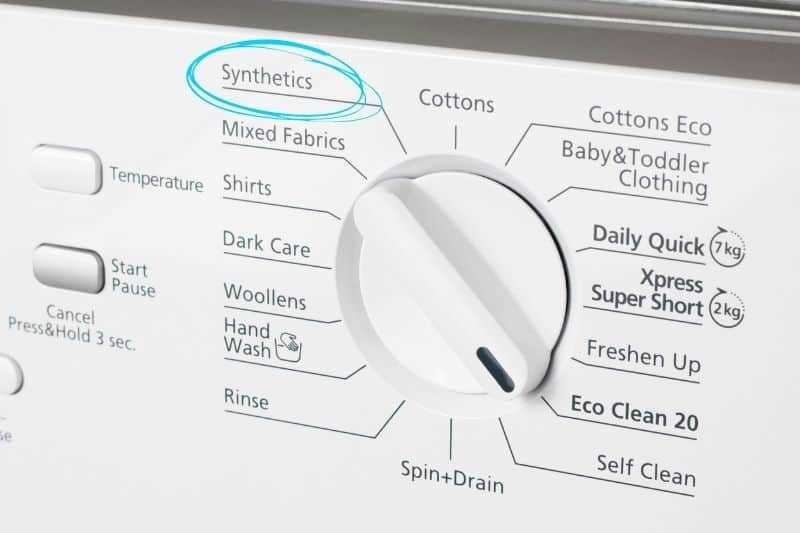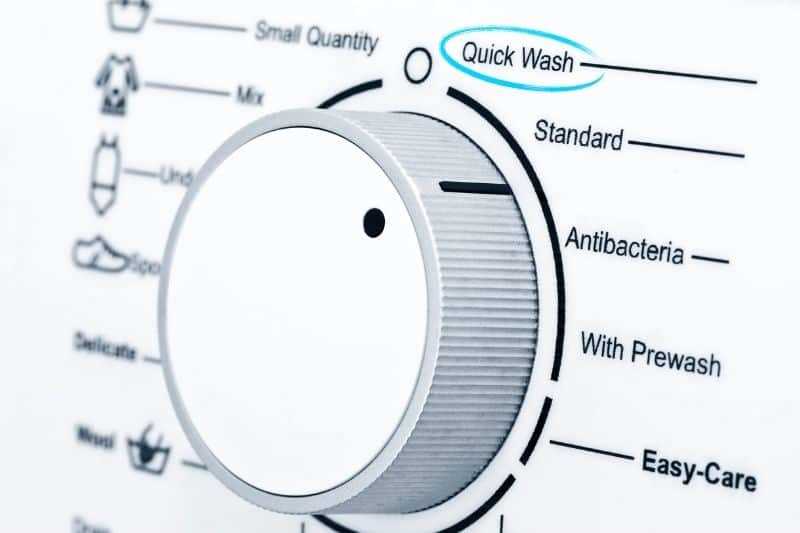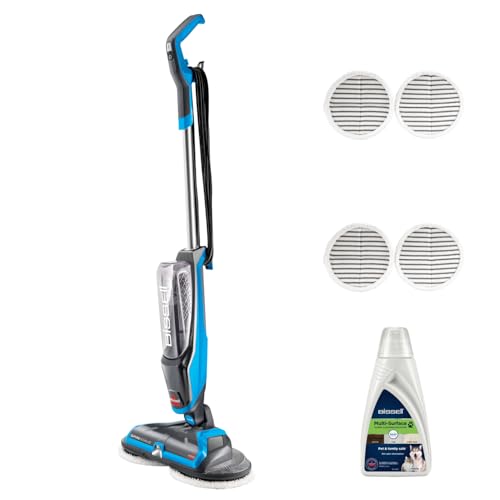




When it comes to doing laundry, time is of the essence. No one wants to spend hours waiting for their clothes to be clean and ready to wear. That’s where the quick wash cycle comes in. Designed to cut down on washing time, this feature has become increasingly popular in modern washing machines.
A quick wash cycle typically takes around 30 minutes to complete, depending on the machine and the specific settings chosen. This makes it perfect for those times when you need clean clothes in a hurry, such as before a last-minute outing or an unexpected guest visit.
During a quick wash cycle, the machine uses a faster spin speed to remove dirt and stains from the clothes. This, combined with a shorter wash time, allows for a quicker turnaround and ensures that your clothes come out fresh and clean.
However, it’s important to note that while a quick wash cycle is convenient, it may not be suitable for all types of laundry. Delicate fabrics or heavily soiled items may require a longer, more thorough wash. It’s always a good idea to check the garment care labels and adjust the settings accordingly to avoid any damage or disappointment.
Understanding Quick Wash Cycles
A quick wash cycle is designed to clean your clothes in a shorter amount of time compared to regular wash cycles. This can be useful when you need to wash a small load of clothes or when you’re short on time.
Benefits of Quick Wash Cycles:
- Time-saving: The main advantage of quick wash cycles is their shorter duration. These cycles typically last anywhere from 15 to 30 minutes, allowing you to complete your laundry quickly.
- Energy-efficient: Quick wash cycles often use less water and energy compared to regular wash cycles. This makes them an environmentally friendly option and can also help you save on your utility bills.
- Gentle on clothes: Quick wash cycles are generally designed to be gentle on your clothes. They use shorter agitation times and lower spin speeds, reducing the risk of damage to delicate fabrics.
Factors Affecting Quick Wash Cycle Duration:
While quick wash cycles are generally shorter, the actual duration can vary depending on several factors:
- Machine type: Different washing machines may have different quick wash cycle durations. Some machines have specific quick wash programs, while others may allow you to adjust the duration and intensity of the wash.
- Load size: The amount of clothes you put in the machine can affect the duration of the quick wash cycle. Smaller loads may require less time to clean compared to larger loads.
- Soil level: If your clothes are heavily soiled, the machine may need more time to remove the dirt and stains. This can affect the duration of the quick wash cycle.
Tips for Using Quick Wash Cycles:
- Sort your clothes: Before using the quick wash cycle, make sure to sort your clothes based on their fabric type and color. This will help prevent any potential damage or color bleeding.
- Use appropriate detergent: Choose a detergent that is specifically formulated for quick wash cycles. These detergents are designed to effectively clean clothes in a shorter amount of time.
- Avoid overloading: While quick wash cycles can handle smaller loads, it’s still important not to overload the machine. Overloading can affect the cleaning efficiency and may lead to poor results.
- Follow manufacturer instructions: Always refer to the user manual of your washing machine for specific instructions on using the quick wash cycle. This will ensure optimal performance and longevity of your machine.
In conclusion, quick wash cycles offer a convenient and time-saving way to clean your clothes. Understanding their benefits and the factors that can affect their duration will help you make the most of this feature on your washing machine.
What is a Quick Wash Cycle?
A quick wash cycle is a feature found in many modern washing machines that allows you to wash your clothes in a shorter amount of time compared to a regular cycle. It is designed for those who are in a hurry or have clothes that are lightly soiled and don’t require a heavy-duty cleaning.
Quick wash cycles vary in duration depending on the make and model of the washing machine. However, most quick wash cycles typically last between 15 to 30 minutes. This makes it a convenient option for those who need to do a quick load of laundry without waiting for a full cycle to complete.
During a quick wash cycle, the washing machine uses a combination of agitation, detergent, and water to clean the clothes. The cycle is shorter because it typically skips some of the steps in a regular cycle, such as prewashing or soaking. This allows the machine to save time while still providing a satisfactory level of cleanliness.
While a quick wash cycle may be convenient, it may not be suitable for all types of clothing or heavily soiled items. It is best suited for lightly soiled clothes that need a quick refresh or for when you need to wash a small load of laundry in a hurry. For heavily soiled items or clothing made of delicate fabrics, a regular cycle may be more appropriate.
It’s important to note that not all washing machines have a quick wash cycle. If you are in the market for a new washing machine and prefer the convenience of a quick wash cycle, be sure to check the features and specifications of the models you are considering.
In conclusion, a quick wash cycle is a time-saving feature found in many modern washing machines. It allows you to quickly wash lightly soiled clothes without waiting for a full cycle to complete. While it may not be suitable for all types of clothing or heavily soiled items, it can be a convenient option for those on the go or in need of a quick refresh.
Factors Affecting the Duration
Several factors can affect the duration of a quick wash cycle. Here are some of the main ones to consider:
Load Size

The size of the load you put in the washing machine can have a significant impact on the duration of the quick wash cycle. If you have a large load, it may take longer to clean compared to a smaller load. This is because the machine needs more time to ensure that all the items are properly washed and rinsed.
Water Temperature
The temperature of the water used in the quick wash cycle can affect its duration. If you choose a higher temperature, it may take longer for the water to reach that temperature, resulting in a longer overall cycle time. On the other hand, using a lower temperature setting may shorten the cycle duration.
Soil Level
The level of soil or dirt on your clothes can also impact the duration of the quick wash cycle. If your clothes are heavily soiled, the machine may need more time and water to remove the dirt effectively. In such cases, the quick wash cycle may take longer compared to lightly soiled clothes.
Detergent and Fabric Softener
The type and amount of detergent and fabric softener you use can affect the duration of the quick wash cycle. Using too much detergent or fabric softener can result in excessive foam or suds, which require additional rinsing and can lengthen the cycle time.
Machine Efficiency

The efficiency and performance of your washing machine can also impact the duration of the quick wash cycle. If you have an older or less efficient machine, it may take longer to complete the cycle compared to a newer and more advanced model.
Additional Features
Some washing machines come with additional features and options that can affect the duration of the quick wash cycle. For example, if your machine has a pre-wash or extra rinse option, choosing these settings may increase the cycle time.
Overall, it’s essential to consider these factors when determining how long a quick wash cycle will take. By understanding these factors, you can optimize your washing machine’s performance and achieve the best results in the shortest possible time.
Type of Washing Machine
1. Top Load Washing Machine
A top load washing machine is the most common type of washing machine found in households. As the name suggests, clothes are loaded into the machine from the top. These machines typically have shorter wash cycles compared to front load machines. The quick wash cycle in a top load machine can take anywhere between 15 to 30 minutes.
2. Front Load Washing Machine

A front load washing machine is becoming increasingly popular due to its efficiency and performance. In a front load machine, clothes are loaded from the front and the machine uses a tumbling action to clean the clothes. The quick wash cycle in a front load machine usually takes longer than a top load machine and can range from 30 to 45 minutes.
3. High-Efficiency Washing Machine
High-efficiency washing machines are designed to use less water and energy, making them more environmentally friendly. They are often front load machines and can have longer wash cycles compared to traditional top load machines. The quick wash cycle in a high-efficiency washing machine can take around 45 minutes to an hour.
4. Compact Washing Machine
Compact washing machines are smaller in size and are often used in small apartments or for traveling purposes. These machines have smaller capacities and shorter wash cycles. The quick wash cycle in a compact washing machine typically takes around 20 to 30 minutes.
5. All-in-One Washing Machine
All-in-one washing machines are versatile machines that combine a washer and a dryer into a single unit. These machines are convenient for small spaces but tend to have longer wash cycles compared to separate washers and dryers. The quick wash cycle in an all-in-one washing machine can take around 45 minutes to an hour.
6. Smart Washing Machine
Smart washing machines are equipped with advanced technology that allows users to control and monitor their washing machine through a smartphone or other smart devices. These machines often have various wash cycle options, including quick wash cycles, which can range from 15 to 60 minutes depending on the selected settings.
7. Commercial Washing Machine
Commercial washing machines are designed for heavy-duty use in laundromats, hotels, and other commercial settings. These machines have larger capacities and longer wash cycles to accommodate larger loads. The quick wash cycle in a commercial washing machine can vary but is generally longer compared to residential machines, taking anywhere from 30 minutes to an hour.
Average Duration of Quick Wash Cycles
When it comes to doing laundry, many people look for ways to save time and get their clothes clean quickly. One option is to use the quick wash cycle on their washing machine, which is designed to clean clothes in a shorter amount of time than a regular cycle. The duration of a quick wash cycle can vary depending on the brand and model of the washing machine, as well as the specific settings chosen by the user.
Typical Duration
On average, a quick wash cycle can take anywhere from 15 to 30 minutes. This is significantly less time compared to a regular wash cycle, which can take up to an hour or more. The shorter duration of a quick wash cycle is possible because the machine uses higher water temperatures and increased agitation to clean the clothes faster.
Factors Affecting Duration
The duration of a quick wash cycle can be affected by several factors, including:
- The size of the load: Larger loads may require more time to clean properly.
- The level of dirtiness: Heavily soiled clothes may need a longer wash cycle to remove stains and dirt.
- The efficiency of the washing machine: Some models are designed to clean clothes faster than others.
- The specific quick wash settings chosen: Some washing machines offer multiple options for quick wash cycles, each with a different duration.
It’s important to note that while a quick wash cycle is faster, it may not be as thorough as a regular cycle. It may not be suitable for heavily soiled or delicate items. If you’re unsure about whether to use a quick wash cycle for a specific load, it’s best to consult the washing machine manual or follow the manufacturer’s guidelines.
Tips for Using the Quick Wash Cycle
If you decide to use the quick wash cycle, here are a few tips to make the most of your laundry time:
- Sort your laundry: Separate your clothes by color and fabric type to ensure the best cleaning results.
- Pre-treat stains: If you have heavily stained clothes, pre-treat the stains before putting them in the washing machine.
- Don’t overload the machine: While the quick wash cycle is designed for smaller loads, it’s important not to overload the machine to ensure proper cleaning.
- Use appropriate detergent: Choose a detergent suitable for the quick wash cycle and follow the recommended dosage.
- Remove clothes promptly: Once the quick wash cycle is complete, remove the clothes from the machine promptly to prevent wrinkles and odors.
By following these tips and considering the factors mentioned above, you can successfully use the quick wash cycle to save time and still get your clothes clean.
Standard Quick Wash Duration
When it comes to the duration of a quick wash cycle, the exact time can vary depending on the model and brand of your washing machine. However, most quick wash cycles typically take around 15 to 30 minutes to complete.
The quick wash cycle is designed for lightly soiled clothes that don’t require heavy cleaning. It is ideal for refreshing clothes that have been worn for a short period of time or for washing small loads that don’t have tough stains.
- On average, a quick wash cycle may take around 15 minutes.
- Some washing machines may have even shorter quick wash cycles, lasting around 10 minutes.
- Other machines may have longer quick wash cycles, up to 30 minutes.
It’s important to note that while quick wash cycles offer convenience and time savings, they may not be as effective at removing tough stains or deep cleaning heavily soiled clothes. For heavily soiled items, it is recommended to use a regular or heavy-duty wash cycle.
Additionally, the duration of the quick wash cycle can be affected by factors such as the water temperature, the spin speed, and the size of the load. Some machines may also have a pre-wash or a rinse option included within the quick wash cycle, which can add a few extra minutes to the overall duration.
Overall, if you’re looking for a quick and efficient way to freshen up your lightly soiled clothes, the quick wash cycle is a great option. Just keep in mind that the exact duration may vary depending on your specific washing machine.
Tips for Reducing Quick Wash Cycle Time
If you are in a hurry and need to reduce the time it takes for your laundry to be washed, here are some tips that can help you decrease the duration of a quick wash cycle:
- Sort your laundry: By sorting your laundry properly, you can avoid the need for additional wash cycles. Separate your clothes by fabric type, color, and level of dirtiness to ensure the most efficient wash.
- Pre-treat stains: Before starting the wash, take a few extra minutes to treat any stubborn stains on your clothes. This will help the detergent work more effectively and reduce the chance of needing an extra wash.
- Use the right amount of detergent: Using too much detergent can create excessive suds, which may prolong the wash cycle. Follow the recommended dosage on the detergent packaging to ensure the right amount is used.
- Choose the appropriate water temperature: Most quick wash cycles use cold water by default, as it saves both time and energy. However, if you have heavily soiled items, you may need to increase the water temperature slightly for better cleaning results.
- Load the washer properly: Overloading the washer can prevent clothes from getting clean. Make sure to leave enough space in the drum for effective agitation and rinsing. Refer to your washer’s manual for the recommended capacity.
- Opt for a higher spin speed: Selecting a higher spin speed during the wash cycle can help extract more water from the clothes, reducing the time needed for drying. However, be mindful of delicate fabrics that may require a gentler spin.
By implementing these tips, you can optimize the efficiency of your quick wash cycle and reduce the overall time it takes to complete a load of laundry.
FAQ
How long does a quick wash cycle usually last?
A quick wash cycle typically takes around 15-30 minutes, depending on the brand and model of your washing machine.
Is a quick wash cycle effective in cleaning clothes?
Yes, a quick wash cycle is designed to clean lightly soiled clothes efficiently. However, for heavily soiled items, it is better to use a regular or heavy-duty cycle for better results.
Can I use a quick wash cycle for delicate items?
Yes, you can use a quick wash cycle for delicate items, but make sure to check the care label on the clothing first. Some delicate fabrics may require a gentler cycle to prevent damage.
Will a quick wash cycle save me time and energy?
Yes, a quick wash cycle is designed to save you time and energy compared to a regular cycle. It uses less water and shorter washing times, making it more efficient for smaller loads or lightly soiled clothes.
Can I customize the duration of a quick wash cycle?
Some washing machines offer options to customize the duration of a quick wash cycle. Check the user manual of your specific washing machine model to see if this feature is available.
How long does a quick wash cycle usually take?
A quick wash cycle typically takes around 15 to 30 minutes.
Can I use the quick wash cycle for all types of laundry?
Yes, the quick wash cycle is designed to handle most types of laundry, but it may not be suitable for heavily soiled or delicate items.











